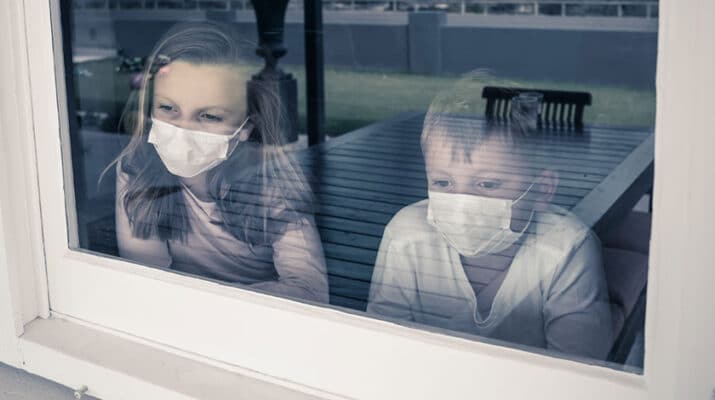Experts offer ways to help children cope during pandemic
By Deborah Jeanne Sergeant
Children have plenty to worry about these days. As the pandemic drags on, they continue to educate at home, missing their sports, clubs and activities. Their parents may be out of work, working at home or working much more than they did before.
Stories of unrest at least populate the news, if not affecting their own cities. The stress of school at home weighs on some children who relied upon their structure of attending school in-person.
“The children affected the most are the ones that went into the pandemic with an issue, like an anxiety disorder, ADHD, and mood disorders,” said physician Steven Lana, with Delaware Pediatrics in Buffalo. “They’re hard hit as they no longer have access to the community resources they need. There’s no way to sub with something virtual.”
Regardless of ability, children thrive on predictability and routine and since last spring, that has been lacking in many areas. Lana said that can be problematic for children.
“This is a completely new situation,” Lana said. “Sometimes, that’s interpreted as there’s no consistency and no one knows what they’re doing with the pandemic. As we learn, we modify our message. We update it.”
It has taken some time for children’s mental health issues to manifest during the pandemic. Many people assumed this would be a temporary or at least short-lived situation before returning to normal.
“At the beginning of the pandemic, some students with anxiety related to school weren’t reporting those symptoms as frequently because of less pressure of performing in the classroom,” said Robert Nazario, licensed master social worker and supervisor of school-based services for Endeavor Health Services in Buffalo and Rochester. “They are feeling it now.”
He added that the stress of the household trickles down to even the understanding and emotions of young children. Some fear falling behind in their schoolwork and miss connecting with classmates. Some children lack the technology to dependably connect for both schoolwork and socializing, which can keep them behind their peers. Those with learning disabilities may struggle even more.
As some schools have planned a return to classes, that can prove stressful for some children.
“Kids are worried about the virus,” Nazario said. “They’re worried about their connection with peers. They haven’t interacted for almost a year. Learning is different in the classroom.”
He said that many children have also expressed concern about social unrest they see on television as well as the financial stressors adults in their home have experienced.
“These have become topics of discussion within families and anxiety with not knowing where all of this is going,” Nazario said. “The stress from the adults in the home has also been the same for the children.”
“Kids not only are exposed to the information they’re exposed to but they observe their parents’ reactions,” said Mark O’Brien, licensed clinical social worker and Erie County’s commissioner of mental health.
While remaining stoic may appear like the right tactic, O’Brien advised that may further push children away because they feel they cannot relate to you. Instead, showing your own struggles at an age-appropriate level can help them feel you understand.
“You have to acknowledge as a parent and as a child what can you and what can’t you control,” he said. “What I can control are my words, actions, behaviors, and my responses. What I can’t control are other people’ behaviors, feelings, decisions, the weather, the pandemic and the economy.”
Influencing the things one can control helps build the predictability that children crave. For example, fun events enjoyed in the past may be canceled; however, the family can plan activities to enjoy together.
Parents should also not act dismissive of their children’s concerns and fears, even if they are wildly inflated. O’Brien encourages parents to help children label their feelings so they can better understand and control them.
“Kids will act out what they can’t talk out,” he said. “The more an adult can help a child put words to it, that puts it within their stream of conscious and makes it less scary. It also makes it less scary for the adult to acknowledge and validate what the child is feeling.”
Beyond holding affirming conversations, the best thing parents can do is to maintain a regular schedule and routine, such as a ritual to begin and end the day where children can check in with their parents like sharing a craft project together, watching a movie or reading a book together, or taking a walk.
For teens, those attachments to parents become less important than the attachments they form with their peers as they begin to mature; however, that parental bond is still vital.
O’Brien said that finding meaningful and pleasurable activities can help children connect with their parents. Regardless of the children’s ages, that represents the best way to support their mental health.
“Help them to do something fun — things that are distracting that take them out of their worries,” he said. “Physical exercise is a great thing. Get them involved in something that helps them help someone else. Kids will feel empowered.”

